The Kadasiddeshwara Bricks and Pottery Materials Producers Cooperative Society in Konnur village of Belagavi district is a unique institution. While celebrations of Ganesh Chaturthi are coming to an end in the rest of the State, for this co-op, it is Ganesha season all year round.
The society is known for making Ganesha idols sold across several states. Members and employees work throughout the year and make around 800-1,000 idols per day. “Last year, we sold around 3.2 lakh idols, big and small,’‘ says Channabasappa Tirakannanavar, the plant supervisor.
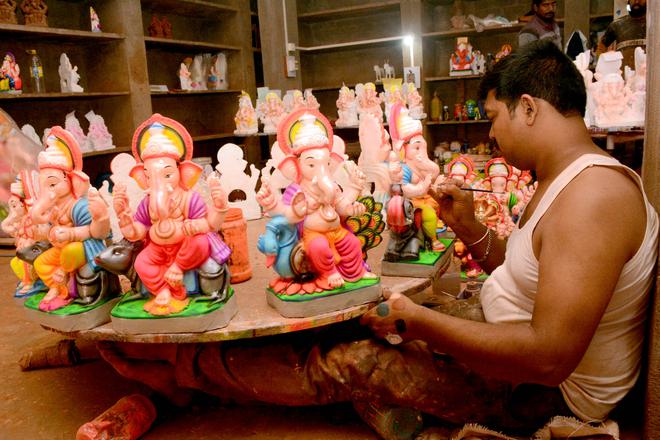
Eco-friendly Ganesha idols
Significantly, the society has been engaged in making eco-friendly Ganesha idols for over six decades, using clay, cotton and non-toxic colours. Even their seven-foot-tall idols are made of clay and not plaster of Paris.
It supplies idols wholesale to retailers who sell them to homes and Ganesha Mandalis across different states. The society hires trucks and other vehicles to deliver the idols to the doorsteps of retailers. All the idols made over 12 months are sold in two months. The employees work two shifts during the three-month holiday season and a single shift during the rest nine months.
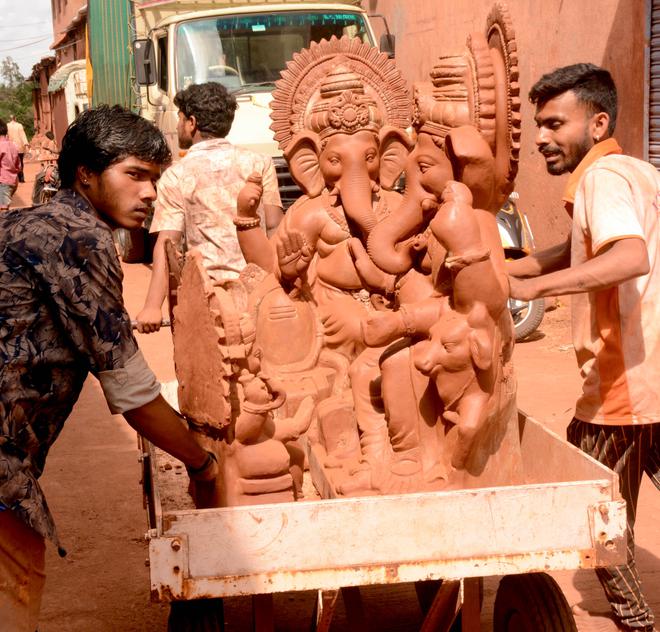
The employees are paid on a job-work basis. On average, each employee takes home around ₹300-450 per day. The employees comprise members of various faiths and communities, and nearly half of them are women.
Assembly line model
The work sheds follow the assembly line model where labourers work on preparing the clay, using the moulds, assembling the parts, cleaning and painting, packing and delivery.
The society has limited local sales, and their prices are quite competitive. A six-inch Ganesha idol costs just ₹100 against similar idols sold for ₹800 in Belagavi. A five feet-tall clay idol is sold for ₹700-₹900 against ₹2500-₹3500 in the Belagavi market.
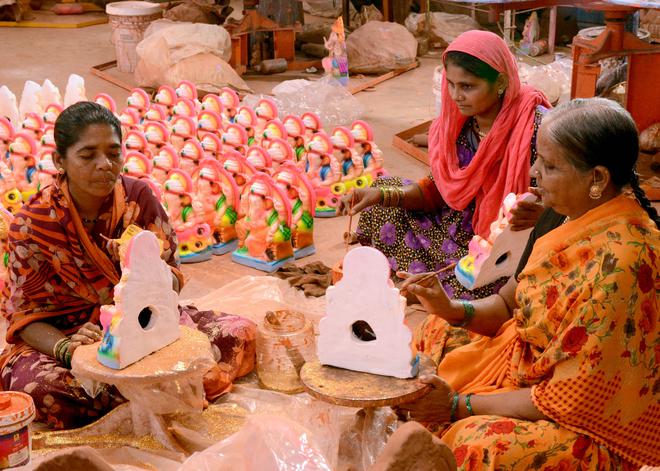
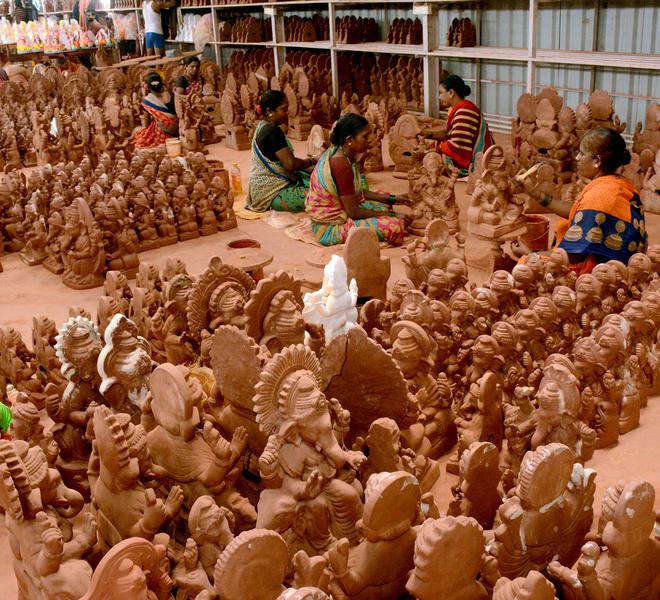
“We have not ventured into retail selling till now. Our children, who are internet savvy, are saying we need to have our own website and sell individual idols across the world. We are considering this suggestion,’‘ Suresh Mallappa Kumbar, former president and now director, says.
Suresh Kumbar feels strongly against PoP idols as they tend to pollute surface and groundwater. “The use of PoP idols continues unabated despite strict orders from the Supreme Court and various High Courts. The central and state governments are not acting tough against the makers or users. The government should not only mandate clay idols but also support clay idol makers,’‘ he says.
The society is facing issues procuring raw materials and logistics support from other agencies. “We get red soil from villages surrounding the Hidkal dam, from pits dug 20-30 feet below the ground. The harvesting can be done on privately owned farmlands or forest lands. When the soil from farmlands is used, we pay a minimal fee to the farmers,” says Suresh.
However, Mr. Suresh says the soil from forest lands is better suited to make idols. But the process is riddled with legal issues. “Officials have stopped us several times. We have appealed to the state government to resolve this issue for us,’‘ he says.
How it all started
In 1962, Shankareppa Kumbar started the society as the village panchayat, and other government agencies wanted to procure bricks, pots, plates and other clay items from registered agencies. His siblings worked hard to handcraft various items, including tea cups, roti girdles and black soil roof tiles. Alongside, they also made Ganesha idols during the festive season.
“Initially, we made a few dozen idols only during the festive season. Then, as the market expanded, we began making idols from a truckload of clay,’‘ recalls Basavva Kumbar, Suresh’s mother. Her husband and Suresh’s father, Mallappa, and his five brothers built on the success of the society. When they realised that there was more demand for clay idols than they could supply, they decided to focus on Ganesha idols and reduced the production of other items.
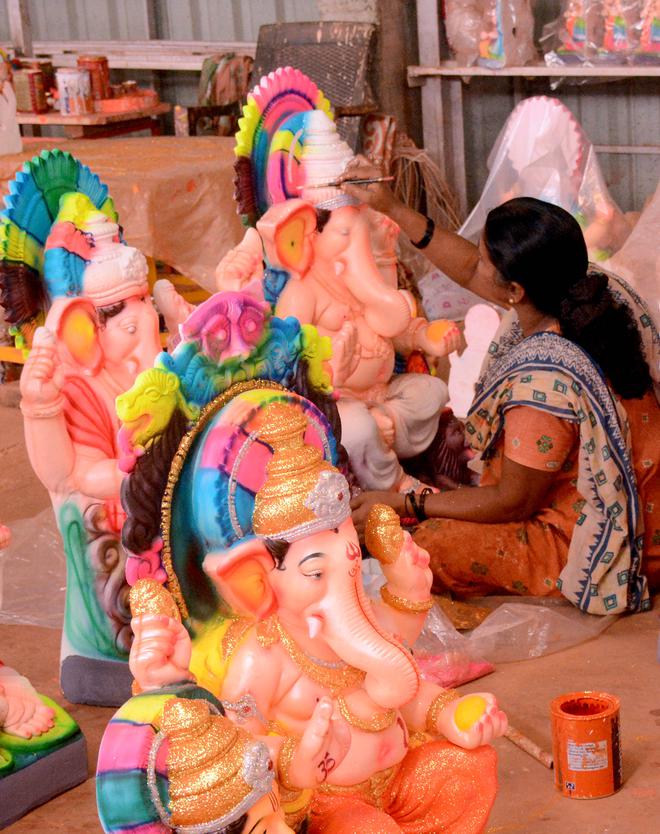
“My husband and his brothers are no longer involved in the day-to-day administration of the society, though the children consult them often,’‘ says Ms. Basavva.
But it was during the third generation of leadership that the society grew exponentially. It now has around 200 members from 60 families and 400 employees. It manages five godowns that house around two lakh idols in various stages of completion. It has a clay preparation unit on the river bed that not only processes red soil from the deep pits of the earth but also reuses old or broken idols.
The society suffered huge losses when its work shed was washed away in the 2019 floods. All the idols and the raw materials stocked in the shed were lost. However, they sprung back and used the government compensation to build new sheds and start afresh.
The society can be contacted at its office on 98864-48785 / 99867-67120.







